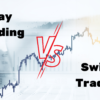If you’ve ever thought about trading forex part-time instead of full-time, we’re here to help.
For many people, trading is more than just another job. It’s a chance to live your life on your terms, free from the daily grind and all the other responsibilities that come with working in an office. And this ability to be free is what makes forex trading so appealing.
But what happens when you decide to become a full-time trader? You need more than just an idea; you need to know whether it’s right for you.
The pros and cons of part-time forex trading

As a part-time forex trader, you know it’s possible to make the same amount of money as a full-time forex trader. And if you’re looking for more flexibility and less pressure, staying part-time can be a good fit. But there are also some considerations around remaining part-time.
First, consider how much money you can make by trading for a few hours daily. The results in your favor when starting:
- You don’t need to study charts or learn new strategies—you can do it all on the fly while working your full-time job!
- You don’t have to put in any extra time after work—you can trade whenever is most convenient!
However, there are also some disadvantages:
- You will not reach your full potential as a trader if you don’t dedicate enough time to learning and practicing new strategies, techniques, and systems. This means that although it may seem like less work overall than being an exclusive trader working day after day, it comes at a cost in terms of missed opportunities due to lack of knowledge.
- It is nearly impossible to trade forex during work hours if you have a full-time job. To trade forex part time, you will need to set aside time during breaks, evenings, after work, or weekends. If you don’t do this, making consistent profits on your investments will be difficult because your trading will not be efficient enough during these times.
The pros and cons of full-time forex trading

Becoming a full-time Forex trader is an exciting and challenging opportunity.
However, if you’re planning on quitting your job, it’s essential to consider how much time and money you’ll need to invest and what lifestyle changes you might have to make.
If you want to go full-time with forex trading, there are some things you need to consider.
When you trade with a part-time mindset, your focus is on making money, and that’s it. You don’t think about the risks or how much time it takes to build a business from scratch.
But when you become a full-time forex trader, your entire focus shifts from making money to keeping the doors open and protecting your capital. It’s no longer just about trading for fun; it’s now about running an entire business with rules and risk management principles in place so that you can stick to them without losing money.
You have to keep costs low, so you don’t lose money or go broke. If this isn’t something you can handle, then perhaps it’s better, for now, to keep working at your current job while trying out this new hobby in the background.
Becoming a full-time trader is a big step. It’s like returning to school and getting a degree in something you have never considered. Here are the pros and cons of trading forex full-time vs part-time.
![]() Pros:
Pros:
- You can focus on your trading strategy and learn more about it, which will help you develop better trading habits in the long run.
- You’ll have more time to think about what’s going on in the market, develop new ideas, and make critical decisions.
- You’ll be able to trade when you’re feeling good rather than when the day’s events have already fried your brain.
![]() Cons
Cons
Many of us have hit a wall regarding our trading, and we start to wonder: Is this something I can continue doing? Or is this a healthy way to spend my time?
Before you make any decisions about your future as a forex trader, there are some things that you should consider. You might be surprised at how much money it takes to become a full-time trader.
As a full-time forex trader, you must be prepared for the ups and downs of the markets. When trading part-time, you have time to recover from losing trades and make up for them later.
But when you trade full-time, your capital needs to be protected from losses while making money and withdrawing funds from your account.
It’s all about the money you have to sustain your trading. The key is knowing how much capital you need and where your money should be invested so that you still have enough leftover capital when it comes time for drawdowns.
What signs show that you are ready for full-time forex trading?

If you are considering full-time forex trading, a few signs show you’re ready for the challenge. First and foremost, you should have at least a year’s worth of experience trading. This means that you should have been trading for at least a year (or more) before going full-time. You also need to be able to do your research and follow your strategy without an external coach or mentor. Finally, it would help if you handled stress well and were motivated by the prospect of big profits.
Final Thoughts
Forex trading can be a full-time or part-time endeavor. If you decide to do it as a side business, understand you’re dedicating an hour or two of your day to forex trading on top of your regular job, which is fine for many people.
However, if you need more time to figure out how forex works and learn the ropes, then consider doing it as a full-time job.
Ultimately, trading is a business. The more time and energy you put into trading, your chances are of succeeding. And whether you trade part-time or full-time depends mostly on how much time you want to devote to this endeavor.
If you enjoyed this article, then be sure to check out Prop trading vs self-funded trading.









